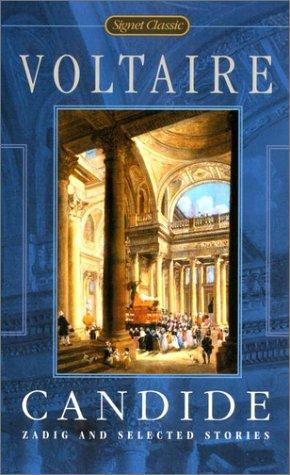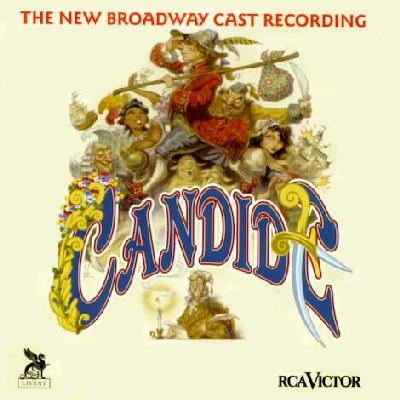
Candide, ou l'Optimisme (pronounced /ˌkænˈdiːd/ in English and [kɑ̃ˈdid] in French) is a French satire written in 1759 by Voltaire, a philosopher of the Age of Enlightenment. The novella has been widely translated, with English versions titled Candide: or, All for the Best (1759); Candide: or, The Optimist (1762); and Candide: or, Optimism (1947).[5] The novella begins with a young man, Candide, who is living a sheltered life in an Edenic paradise and being indoctrinated with Leibnizian optimism (or simply optimism) by his mentor, Pangloss. The work describes the abrupt cessation of this lifestyle, followed by Candide's slow, painful disillusionment as he witnesses and experiences great hardships in the world. Voltaire concludes with Candide, if not outright rejecting optimism, advocating an enigmatic precept, "we must cultivate our garden", in lieu of the Leibnizian mantra of Pangloss, "all is for the best in the best of all possible worlds".
Candide is characterized by its sarcastic tone and its erratic, fantastical, and fast-moving plot. A picaresque novel with a story similar to that of a more serious bildungsroman, it parodies many adventure and romance clichés, the struggles of which are caricatured in a tone that is mordantly matter-of-fact. Still, the events discussed are often based on historical happenings, such as the Seven Years' War and the 1755 Lisbon earthquake.[6] As philosophers of Voltaire's day contended with the problem of evil, so too does Candide in this short novel, albeit more directly and humorously. Voltaire ridicules religion, theologians, governments, armies, philosophies, and philosophers through allegory; most conspicuously, he assaults Leibniz and his optimism.[7][
Source:
http://en.wikipedia.org/wiki/Candide

Candide (1956) is an operetta with music composed by Leonard Bernstein, based on the novella of the same name by Voltaire. The original libretto was written by Lillian Hellman, but since 1974, has been generally performed with a book by Hugh Wheeler, which is more faithful to Voltaire's novel. [1] The primary lyricist was the poet Richard Wilbur. Other contributors to the text were John Latouche, Dorothy Parker, Lillian Hellman, Stephen Sondheim, and Leonard Bernstein. Hershy Kay, John Mauceri, and Maurice Peress contributed orchestrations.
Candide first opened on Broadway as a musical on 1 December 1956. The premier production was directed by Tyrone Guthrie and conducted by Samuel Krachmalnick.[101] While this production was a box office flop, the music was highly praised, and an original cast album was made. The album gradually became a cult hit, but Hellman's libretto was criticised as being too serious an adaptation of Voltaire's novel.[102] Candide would be more popular seventeen years later with a new libretto by Hugh Wheeler.
Source:
http://en.wikipedia.org/wiki/Candide


Let us review
Lesson eleven!
STUDENTS:
Paragraph two
Axion seven
PANGLOSS:
Once one dismisses
The rest of all possible worlds
One finds that this is
The best of all possible worlds!
STUDENTS:
Once one dismisses
The rest of all possible worlds
One finds that this is
The best of all possible worlds!
PANGLOSS:
Pray classify
Pigeons and camels
MAXIMILLIAN:
Pigeons can fly!
PAQUETTE:
Camels are mammals!
PANGLOSS:
There is a reason
For everything under the sun!
CANDIDE:
There is a reason
For everything under the sun!
MAXIMILLIAN:
Objection!
What about snakes?
PANGLOSS:
Snakes!
'Twas snake that tempted mother Eve
Because of snake we now believe
That though depraved
We can be saved
>From hellfire and damnation
(Because of snake's temptation!)
If snake had not seduced our lot
And primed us for salvation
Jehova could not pardon all
The sins that we call cardinal
Involving bed and bottle!
ALL
Now onto Aristotle!
PANGLOSS
Mankind is one
All men are brothers!
STUDENTS:
As you'd have done
Do unto others!
PANGLOSS
It's understood in
This best of all possible worlds--
MAXIMILLIAN
All's for the good in
This best of all possible worlds!
CANDIDE:
Objection!
What about war?
PANGLOSS:
War!
Though war may seem a bloody curse
It is a blessing in reverse
When canon roar
Both rich and poor
By danger are united!
(Till every wrong is righted!)
Philosophers make evident
The point that I have cited
'Tis war makes equal -- as it were --
The noble and the commoner
Thus war improves relations!
ALL:
Now onto conjugations!
PANGLOSS:
Amo, amas,
Amat, amamus!
STUDENTS:
Amo, amas,
Amat, amamus!
PANGLOSS:
Proving that this is
The best of all possible worlds
With love and kisses [blows a kiss]
The best of all possible worlds!
STUDENTS:
Proving that this is
The best of all possible worlds
With love and kisses [blows a kiss]
The best of all possible worlds!
PANGLOSS
Quod erat demunstrandum!
QED!
Amo, amas,
Amat amamus!
MAXIMILLIAN: (overlapping)
Quod erat demunstrandum!
QED!
Amo, amas!
Quod erat demunstrandum!
PAQUETTE: (overlapping)
Quod erat demunstrandum!
QED!
Amo, amas!
CANDIDE: (overlapping)
Quod erat demunstrandum!
QED!
CUNEGONDE: (overlapping)
Quod erat demunstrandum!
ALL:
Quod erat demunstrandum
In this best of all
Possible, possible, possible worlds!
Quod erat demunstrandum!
Q!
E!
D!!!!!!!!!!!



--
Together, we can change the world, one mind at a time.
Have a great day,
Tommy
__._,_.___
No comments:
Post a Comment